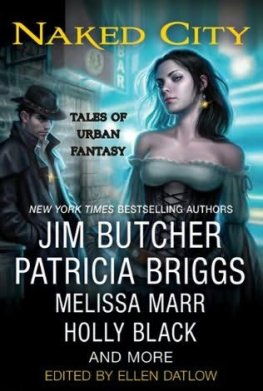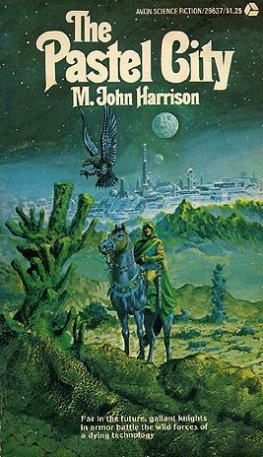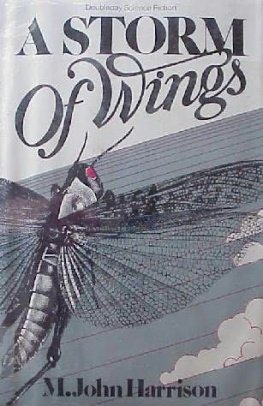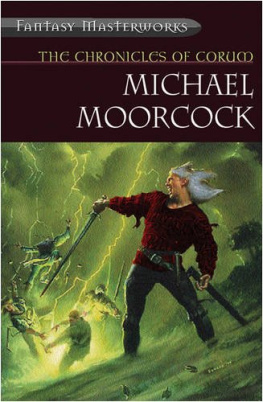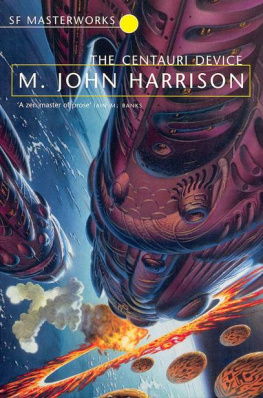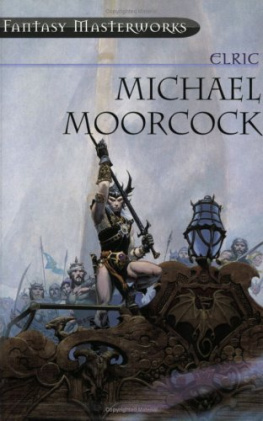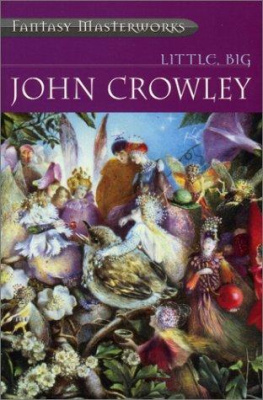Fantasy Masterworks Volume 7
Table of Contents
PRAISE FOR M. JOHN HARRISON
A Zen master of prose. Iain Banks, author of The Algebraist
That M. John Harrison is not a Nobel Laureate proves the bankruptcy of the literary establishment. Austere, unflinching and desperately moving, he is one of the very great writers alive today. And yes, he writes fantasy and SF, though of a form, scale and brilliance that it shames not only the rest of the field, but most modern fiction.
China Miville, author of Iron Council
In the best tradition of the finest writing, Viriconium is universal and particular together. It is the ultimate city, the very essence of what we understand such a collection of buildings, thoroughfares, monuments, institutions, concerns, inhabitants, lives and fates to be.
Iain Banks, author of The Algebraist
Exemplary fictions of unease shot through with poetic insight and most beautifully written. Angela Carter, author of The Magic Toyshop
Viriconium is a scintillating kaleidoscope of cities. Observer
Beautifully written and disconcertingly haunting. Time Out
The fantasy is grounded in M. John Harrisons sense of reality.... It is lifelike. It is also written in the kind of prose which, as you tap a nail on a crystal glass, never rings false. Guardian
[Harrison] writes with a cool and disciplined hand. His prose is always elegant, but never vain... unerringly he seeks the underside of things. Times Literary Supplement
A witty and truly imaginative writer. Literary Review
Enjoyably rancid imagination... extraordinary, lively, and moving. Sunday Times
M. John Harrisons Viriconium series is brilliant, beautiful, and absolutely essential reading. The breadth of vision and imagination alone in these books is unparalleled. It is truly one of a kind and will continue to haunt you in the best possible way for years.
Jonathan Carroll, author of White Apples
M. John Harrisons Viriconium sequence is the jewel in the crown of twentieth-century fantasy, a work that proves irrefutably that fantastic literature can be Art with a capital A, holding its own alongside the very finest writing of our time, or any other.
Elizabeth Hand, author of Mortal Love
M. John Harrison is a true master of English prose. He possesses the eye of a painter, the ear of a bard, and a rigorous and playful intellect. The Viriconium novels and stories are infused with a haunting genius that never falters. K. J. Bishop, author of The Etched City
ALSO BY M. JOHN HARRISON
NOVELS
The Commited Men (1971)
The Centauri Device (1974)
Climbers (1989)
The Course of the Heart (1992)
Signs of Life (1997)
SHORT STORY COLLECTIONS
The Machine in Shaft Ten and Other Stories (1975)
The Ice Monkey and Other Stories (1983)
GRAPHIC NOVELS
The Luck in the Head (1991) with Ian Millar
INTRODUCTION
On Viriconium: Some Notes Towards an Introduction
People are always pupating their own disillusion, decay, age. How is it they never suspect what they are going to become, when their faces already contain the faces they will have twenty years from now?
A Young Mans Journey Towards Viriconium
And I look at the Viriconium cycle of M. John Harrison and wonder whether The Pastel City knew it was pupating In Viriconium or the heartbreak of A Young Mans Journey Towards Viriconium inside its pages, whether it knew what it was going to become.
Some weeks ago and halfway around the world, I found myself in the centre of Bologna, that sunset-coloured medieval towered city which waits in the centre of a modern Italian city of the same name, in a small used bookshop, where I was given a copy of the Codex Seraphinianus to inspect. The book, created by the artist Luigi Serafini, is, in all probability, an art object. There is text, but the alphabet resembles an alien code, and the illustrations (which cover such aspects of life as gardening, anatomy, mathematics, geometry, card games, flying contraptions, and labyrinths) bear only a passing resemblance to those we know in this world at this time: in one picture a couple making love becomes a crocodile, which crawls away; and the animals, plants, and ideas are strange enough that one can fancy the book something that has come to us from a long time from now or from an extremely long way away. It is, lacking another explanation, art. And leaving that small shop, walking out into the colonnaded shaded streets of Bologna, holding my book of impossibilities, I fancied myself in Viriconium. And this was odd, only because until then I had explicitly equated Viriconium with England.
Viriconium, M. John Harrisons creation, the Pastel City in the afternoon of the world; two cities in one, in which nothing is consistent, tale to tale, save a scattering of place-names, although I am never certain that the names describe the same place from story to story. Is the Bistro Californium a constant? Is Henrietta Street?
M. John Harrison, who is Mike to his friends, is a puckish person of medium height, given to enthusiasms and intensity. He is, at first glance, slightly built, although a second glance suggests he has been constructed from whips and springs and good, tough leather, and it comes as no surprise to find that Mike is a rock climber, for one can without difficulty imagine him clinging to a rock face on a cold, wet day, finding purchase in almost invisible nooks and pulling himself continually up, man against stone. I have known Mike for over twenty years; in the time I have known him his hair has lightened to a magisterial silver, and he seems to have grown somehow continually younger. I have always liked him, just as I have always been more than just a little intimidated by his writing. When he talks about writing he moves from puckish to possessed. I remember Mike in conversation at the Institute for Contemporary Art trying to explain the nature of fantastic fiction to an audience: he described someone standing in a windy lane, looking at the reflection of the world in the window of a shop, and seeing, sudden and unexplained, a shower of sparks in the glass. It is an image that raised the hairs on the back of my neck, that has remained with me, and that I would find impossible to explain. It would be like trying to explain Harrisons fiction, something I am attempting to do in this introduction, and, in all probability, failing.
There are writers writers, of course, and M. John Harrison is one of those. He moves elegantly, passionately, from genre to genre, his prose lucent and wise, his stories published as sf or as fantasy, as horror or as mainstream fiction. In each playing field, he wins awards and makes it look so easy. His prose is deceptively simple, each word considered and placed where it can sink deepest and do the most damage.
The Viriconium stories, which inherit a set of names and a sense of unease from a long-forgotten English Roman City (English antiquaries have preferred Uriconium, foreign scholars Viroconium or Viriconium, and Vriconium has also been suggested. The evidence of our ancient sources is somewhat confused, a historical website informs us) are fantasies, three novels and a handful of stories which examine the nature of art and magic, language and power.
There is, as I have already mentioned, and as you will discover, no consistency to Viriconium. Each time we return to it, it has changed, or we have. The nature of reality shifts and changes. The Viriconium stories are palimpsests, and other stories and other cities can be seen beneath the surface. Stories adumbrate other stories. Themes and characters reappear, like Tarot cards being shuffled and redealt.

![Majkl Suenvik - Tales of Old Earth [A collection of short-stories]](/uploads/posts/book/894597/thumbs/majkl-suenvik-tales-of-old-earth-a-collection-of.jpg)
